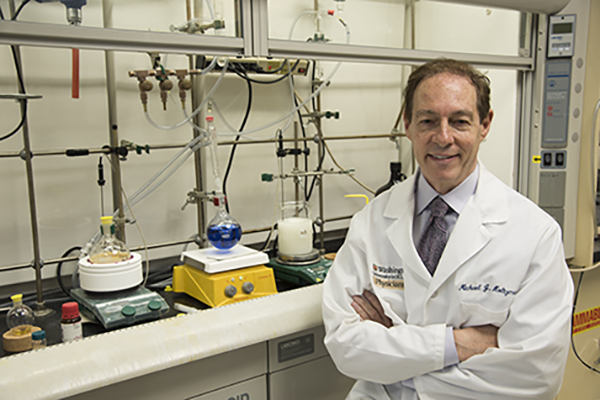WashU Experts: Science cuts would cause ‘chilling effect’
Proposed federal budget cuts to two major programs could translate into fewer treatments, fewer cures, fewer drug findings, fewer researchers and fewer breakthroughs in areas where the United States is a world leader, say science and health experts at Washington University in St. Louis.
What is wrong with pharma?
The general public has a sense that something is amiss with the pharmaceutical industry, but few might consider it in a state of collapse. Washington University’s Michael Kinch tries to convince otherwise in “A Prescription for Change,” his history and review of the industry.
Study reveals new, potent way to boost immunity and fight viruses
Studying mice with a variety of viral infections, scientists at the School of Medicine have demonstrated a way to dial up the body’s innate immune defenses while simultaneously attacking a protein that many viruses rely on to replicate. The findings reveal previously unknown weapons in the body’s antiviral immune arsenal and provide guidelines for designing drugs that could be effective against a broad range of viruses.
Finding points to a cause of chronic lung disease
Scientists have long suspected that respiratory viruses play a critical role in the development of chronic lung diseases such as asthma and chronic obstructive pulmonary disease (COPD). Studying mouse and cell models of this process, researchers now have shown how immune cells dispatched to the lung to destroy a respiratory virus can fail to disperse after their job is done, setting off a chain of inflammatory events that leads to long-term lung problems.
$5 million funds research to develop drugs for common cold, respiratory diseases
A Washington University drug discovery program, led by Michael Holtzman, MD, has received three grants totaling more than $5 million to develop new medical therapeutics for respiratory diseases. The target illnesses range from the common cold to life-threatening lung disease.
‘The process by which drugs are discovered and developed will be fundamentally different in the future’
Over the past several decades, Michael Kinch of Washington University in St. Louis says, the pharmaceutical industry has managed to dismantle itself. In a provocative series of articles and interviews, Kinch, the director of the Center for Research Innovation in Businessat the university, has been describing the history of this dismantling and its implications for the future of medicine.
Drugs limiting excess mucus could save lives
Respiratory conditions that restrict breathing such as asthma and chronic obstructive pulmonary disease (COPD) are common killers worldwide. But no effective treatments exist to address the major cause of death in these conditions — excess mucus production. Now, Washington University researchers have described the molecular pathway responsible for excess mucus in airway cells and have used that information to design a series of new drugs that inhibit that pathway.
New technique could identify drugs that help fight broad range of viruses
Results of a new study from Washington University’s Drug Discovery Center demonstrate the feasibility of a novel strategy in drug discovery: screening large numbers of existing drugs — often already approved for other uses — to see which ones activate genes that boost natural immunity.




